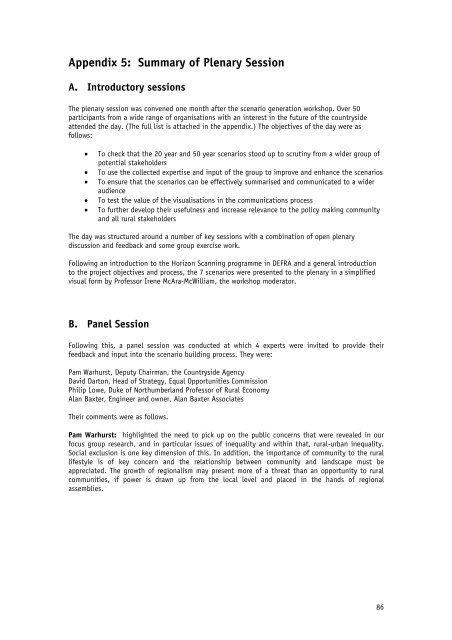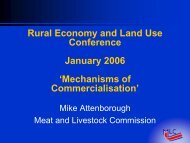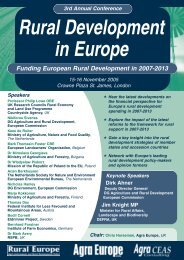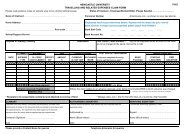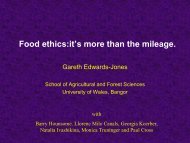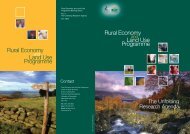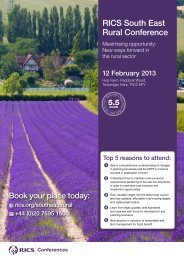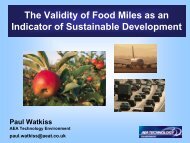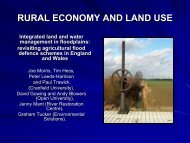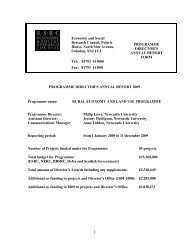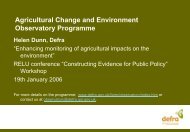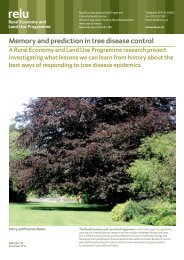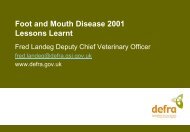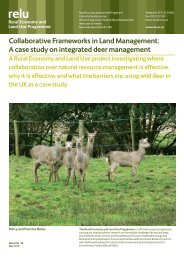Future Society in 2024: 21st Century 'Good Life' - Rural Economy ...
Future Society in 2024: 21st Century 'Good Life' - Rural Economy ...
Future Society in 2024: 21st Century 'Good Life' - Rural Economy ...
Create successful ePaper yourself
Turn your PDF publications into a flip-book with our unique Google optimized e-Paper software.
Appendix 5: Summary of Plenary Session<br />
A. Introductory sessions<br />
The plenary session was convened one month after the scenario generation workshop. Over 50<br />
participants from a wide range of organisations with an <strong>in</strong>terest <strong>in</strong> the future of the countryside<br />
attended the day. (The full list is attached <strong>in</strong> the appendix.) The objectives of the day were as<br />
follows:<br />
• To check that the 20 year and 50 year scenarios stood up to scrut<strong>in</strong>y from a wider group of<br />
potential stakeholders<br />
• To use the collected expertise and <strong>in</strong>put of the group to improve and enhance the scenarios<br />
• To ensure that the scenarios can be effectively summarised and communicated to a wider<br />
audience<br />
• To test the value of the visualisations <strong>in</strong> the communications process<br />
• To further develop their usefulness and <strong>in</strong>crease relevance to the policy mak<strong>in</strong>g community<br />
and all rural stakeholders<br />
The day was structured around a number of key sessions with a comb<strong>in</strong>ation of open plenary<br />
discussion and feedback and some group exercise work.<br />
Follow<strong>in</strong>g an <strong>in</strong>troduction to the Horizon Scann<strong>in</strong>g programme <strong>in</strong> DEFRA and a general <strong>in</strong>troduction<br />
to the project objectives and process, the 7 scenarios were presented to the plenary <strong>in</strong> a simplified<br />
visual form by Professor Irene McAra-McWilliam, the workshop moderator.<br />
B. Panel Session<br />
Follow<strong>in</strong>g this, a panel session was conducted at which 4 experts were <strong>in</strong>vited to provide their<br />
feedback and <strong>in</strong>put <strong>in</strong>to the scenario build<strong>in</strong>g process. They were:<br />
Pam Warhurst, Deputy Chairman, the Countryside Agency<br />
David Darton, Head of Strategy, Equal Opportunities Commission<br />
Philip Lowe, Duke of Northumberland Professor of <strong>Rural</strong> <strong>Economy</strong><br />
Alan Baxter, Eng<strong>in</strong>eer and owner, Alan Baxter Associates<br />
Their comments were as follows.<br />
Pam Warhurst: highlighted the need to pick up on the public concerns that were revealed <strong>in</strong> our<br />
focus group research, and <strong>in</strong> particular issues of <strong>in</strong>equality and with<strong>in</strong> that, rural-urban <strong>in</strong>equality.<br />
Social exclusion is one key dimension of this. In addition, the importance of community to the rural<br />
lifestyle is of key concern and the relationship between community and landscape must be<br />
appreciated. The growth of regionalism may present more of a threat than an opportunity to rural<br />
communities, if power is drawn up from the local level and placed <strong>in</strong> the hands of regional<br />
assemblies.<br />
86


